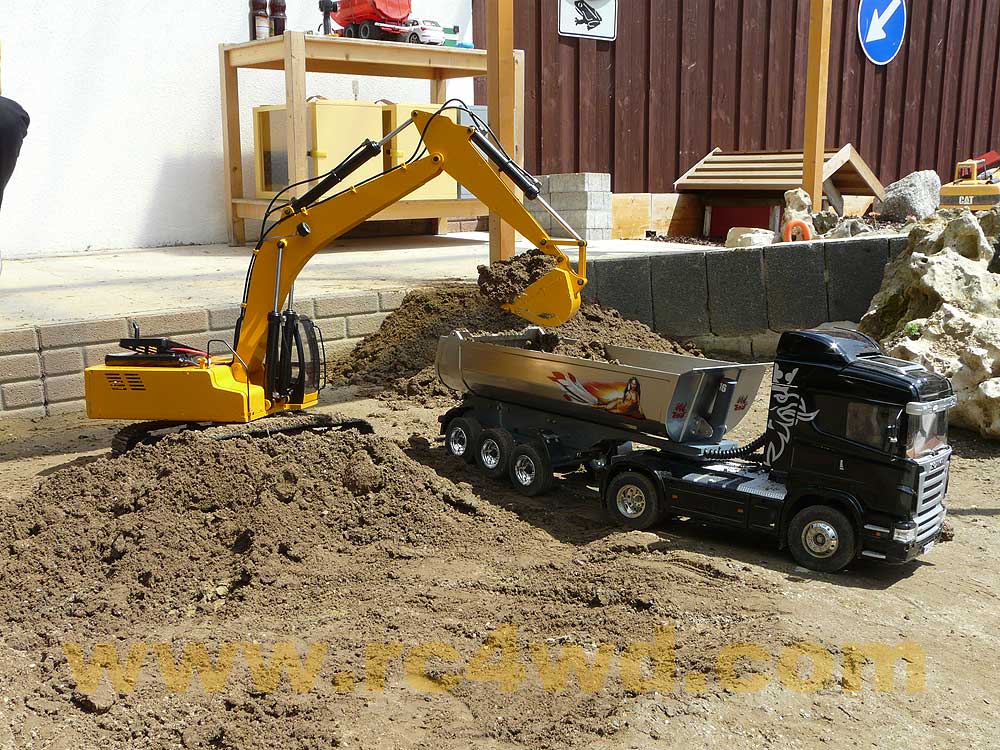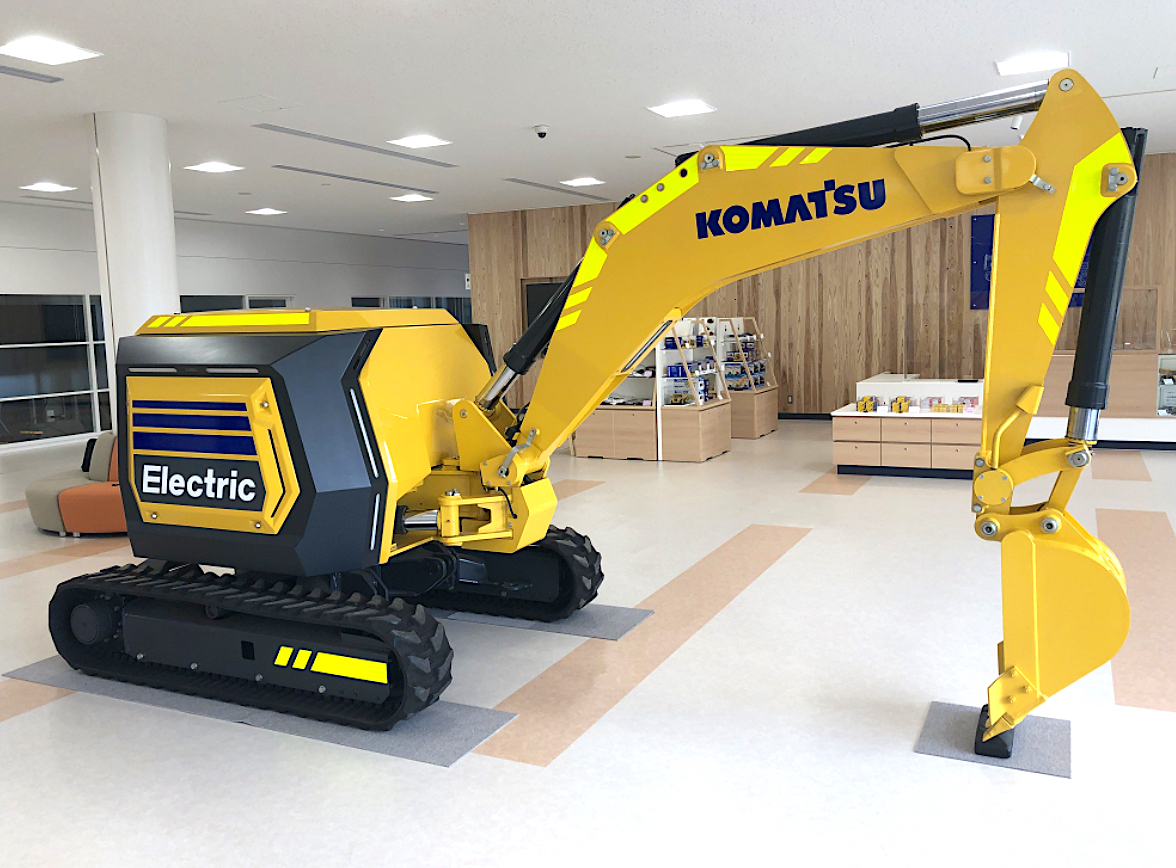Why a rc excavator Can Transform Your Earthmoving Tasks
Wiki Article
Comprehending How Excavator Works and Its Influence On Performance
Excavators play a crucial role in building and construction and mining operations, depending on an intricate interaction of hydraulic and mechanical systems. Their capability to execute a variety of tasks pivots on both their layout and the technology incorporated within. Recognizing these components can greatly affect functional efficiency and performance. As advancements continue to reshape the sector, one should think about just how these adjustments will certainly affect future practices and performance.The Essentials of Excavator Mechanics

The Function of Hydraulic Equipments in Excavators
At the heart of excavator operation lies the hydraulic system, which plays a pivotal function in powering the maker's activities and features. This system utilizes pressurized hydraulic fluid to transfer energy, allowing numerous activities such as swinging, lifting, and digging. By utilizing the principles of hydraulics, excavators can do jobs with exceptional accuracy and force, improving general operational efficiency.The hydraulic system includes essential components, including cyndrical tubes, pumps, and shutoffs, which work together to regulate the circulation and instructions of the fluid. When the operator involves the controls, the hydraulic liquid is routed to specific cylinders, translating the operator's commands into physical activity. This system enables responsive and smooth activities, which are crucial in building and excavation atmospheres. double e volvo rc excavator. The efficiency of the hydraulic system straight influences the efficiency and versatility of the excavator, making it a vital element in modern-day excavation processesKey Parts of an Excavator
Understanding the key parts of an excavator is essential for grasping just how this effective device operates. An excavator includes a number of significant components, consisting of the undercarriage, home, arm, bucket, and boom. The undercarriage offers stability and mobility, often featuring wheels or tracks to navigate numerous terrains. Your house has the engine and hydraulic systems, enabling the operator to control motion and power the equipment. The boom prolongs from your home, making it possible for vertical reach, while the arm attaches to the bucket, promoting digging and training operations.Additionally, the taxi houses the operator, geared up with controls for accurate handling. Each of these components plays a crucial role in the excavator's total performance, adding to its performance and effectiveness on construction sites. Recognizing these parts aids in keeping and optimizing excavator efficiency, making sure tasks are completed securely and successfully.Add-on Flexibility and Its Advantages
Attachment flexibility is an essential aspect of excavators, enabling drivers to switch over in between different tools customized for particular tasks. This versatility not just enhances job effectiveness yet additionally adds to cost-effectiveness by reducing the need for multiple makers. Comprehending the different kinds of attachments offered can considerably affect the overall performance and functionality of an excavator on task sites.Sorts of Accessories
While excavators are mostly identified for their excavating capacities, their real flexibility depends on the large selection of attachments available. These attachments improve the excavator's capability, allowing it to carry out different tasks beyond excavation. Typical add-ons consist of pails (for digging and scooping), hydraulic thumbs (for understanding materials), and augers (for piercing openings) Grapples are used for moving and handling particles, while rippers can break up hard surface areas. Various other specialized add-ons, such as trenchers and rakes, allow excavators to adapt to certain work needs. This variety not only boosts the equipment's utility throughout different sectors, consisting of building and construction, landscape design, and demolition, but likewise permits operators to tailor their tools to meet certain project demands effectively.Raised Task Efficiency
Making the most of work effectiveness is a main benefit of using different excavator attachments. Different attachments allow an excavator to perform multiple tasks without requiring to switch equipment, saving useful time and labor. Utilizing a hydraulic hammer can damage concrete while a bucket add-on can excavate soil, making it possible for a seamless process. This convenience decreases downtime associated with devices modifications and improves performance on-site. Additionally, specialized accessories boost precision in tasks such as grading or landscape design, resulting in greater quality outcomes. The capability to adjust to numerous job needs not just streamlines operations however likewise lessens the demand for extra machinery, making sure that tasks are finished swiftly and efficiently. In general, attachment versatility considerably adds to increased work efficiency in excavation work.Cost-Effectiveness and Versatility
Cost-effectiveness is a significant advantage of using flexible excavator accessories. These accessories allow a single excavator to carry out multiple tasks, reducing the need for additional machinery and labor - double e volvo rc excavator. By switching over useful reference in between pails, hammers, and grapples, drivers can deal with various jobs, from digging to demolition, thereby making the most of equipment usage. This adaptability not just reduces functional expenses but additionally lessens downtime related to changing equipment. In addition, the capacity to personalize excavators with specialized attachments improves productivity, as they can effectively deal with varied tasks according to task demands. To conclude, the combination of cost-effectiveness and versatility in excavator accessories adds to enhanced functional effectiveness and source appropriation in building and excavation tasks
Advanced Innovation in Modern Excavators
Modern excavators are increasingly equipped with innovative innovation that transforms excavation procedures. Automation enhances operations, while enhanced gas effectiveness decreases operational costs. In addition, clever control systems enhance precision and security, marking a considerable evolution in excavation equipment.Automation in Excavation Processes
As excavation modern technology progresses, automation has become an essential part in improving effectiveness and accuracy on task sites. Modern excavators are furnished with sophisticated automated systems that assist in tasks such as grading, excavating, and trenching with minimal driver intervention. These systems make use of sensing units, GPS, and device knowing formulas to ensure exact positioning and deepness control, significantly decreasing the margin for mistake. Additionally, automation permits operators to concentrate on calculated decision-making rather than hands-on controls, bring about improved efficiency overall. Such innovations not only simplify workflows yet also improve safety and security by minimizing human error in intricate procedures. The combination of automation in excavation procedures stands for a substantial advancement in building and construction technology, driving the sector in the direction of greater efficiency and efficiency.Boosted Gas Effectiveness
Developments in innovation have actually likewise resulted in considerable enhancements in gas performance for modern excavators. Modern equipments are equipped with innovative engines that optimize power outcome while minimizing gas usage. These engines make use of cutting-edge burning innovations, such as turbocharging and direct fuel injection, to enhance performance and efficiency. In addition, light-weight products in building reduce total weight, enabling much less power expenditure during procedure. The introduction of variable rate controls allows drivers to adjust engine efficiency according to details jobs, further minimizing gas use. Therefore, these enhancements not only reduced functional costs yet likewise add to ecological sustainability by decreasing exhausts. On the whole, enhanced fuel effectiveness in excavators is a crucial advancement that strengthens performance and financial viability in the construction industry.Smart Control Solution
While operators navigate progressively intricate job sites, clever control systems in excavators have become crucial tools for enhancing performance and accuracy. These innovative innovations utilize formulas and sensors to check different parameters such as lots weight, surface conditions, and operational efficiency. By automatically changing hydraulic features, smart systems enhance machine performance, leading to enhanced performance and decreased endure components. Furthermore, drivers take advantage of intuitive interfaces that give real-time feedback and diagnostics, enabling educated decision-making. This combination of modern technology not only improves procedures however additionally decreases human error, adding to more secure job settings. As the construction market remains to develop, smart control systems will certainly play an important duty fit the future of excavator effectiveness and efficiency.Enhancing Operational Effectiveness With Excavators
Excavators play a necessary role in improving operational effectiveness across numerous construction and excavation projects. Their flexibility permits multiple jobs, consisting of product, training, and digging handling, which improves operations and lowers the requirement for added tools. With powerful hydraulic systems, excavators can execute heavy-duty tasks with accuracy, significantly reducing the time needed to total projects. The integration of innovative modern technology, such as general practitioner and automated look at more info controls, additionally enhances their operation, enabling drivers to accomplish greater precision and lower product waste. Additionally, modern excavators are made to consume less gas and decrease discharges, adding to both price financial savings and environmental sustainability. By utilizing excavators effectively, construction teams can boost efficiency, meet task target dates, and enhance overall website monitoring. This multifunctionality and performance make excavators important tools in the contemporary construction landscape.The Future of Excavators in Building And Construction and Mining Industries
As the building and mining industries advance, the future of excavators is positioned for significant makeover driven by technical innovation and transforming operational needs. Breakthroughs in automation and expert system are improving excavator abilities, enabling boosted precision and performance in operations. Self-governing excavators are arising, decreasing the need for human intervention and reducing the risk of accidents.Moreover, the combination of telematics and IoT technology makes it possible for real-time tracking of device performance and anticipating upkeep, enhancing uptime. Environmentally friendly designs, including electrical and hybrid models, are acquiring grip, straightening with sustainability objectives within the industry.Additionally, using sophisticated products and lighter layouts boosts gas efficiency while preserving performance standards. As these trends progression, excavators will certainly play an essential duty in meeting the increasing needs for performance and safety and security in building and construction and mining, ultimately changing functional landscapes.Regularly Asked Concerns
Exactly How Do Weather Condition Problems Influence Excavator Performance?

Climate condition substantially influence excavator performance, as rain and mud can prevent grip and security, while severe temperature levels may influence hydraulic systems. Operators should adapt to these variables to guarantee ideal capability and security during operations.
What Precaution Should Operators Comply With While Making Use Of Excavators?
Safety and security steps for excavator operators include wearing ideal personal protective tools, carrying out pre-operation inspections, making certain proper interaction with ground employees, keeping a risk-free distance from above risks, and sticking to recognized functional procedures to avoid mishaps.Just How Typically Should Excavators Be Kept for Optimal Efficiency?
Excavators need to be maintained on a regular basis to guarantee peak performance, commonly every 250 operating hours or as specified by the producer. Regular checks boost reliability, protect against unexpected break downs, and prolong the life-span of the equipment.
What Is the Ordinary Lifespan of an Excavator?
The average life expectancy of an excavator normally varies from 10,000 to 15,000 hours of operation. Factors influencing durability consist of maintenance methods, running problems, and the quality of the machine itself, affecting you can check here overall productivity and effectiveness.
Can Excavators Run on Unequal Surface Effectively?
Excavators can operate properly on irregular terrain as a result of their verbalized styles and flexible tracks. These attributes allow them to maintain stability and traction, allowing efficient procedure in tough atmospheres frequently experienced in building and landscape design tasks. Each of these components plays a crucial function in the excavator's general functionality, adding to its performance and performance on construction sites. Making the most of task performance is a key benefit of using numerous excavator add-ons. While operators browse increasingly complicated job sites, clever control systems in excavators have emerged as crucial devices for improving effectiveness and accuracy. Excavators play a crucial duty in improving functional effectiveness throughout different building and construction and excavation jobs. Advances in automation and man-made intelligence are reshaping excavator abilities, enabling for improved precision and effectiveness in procedures.Report this wiki page